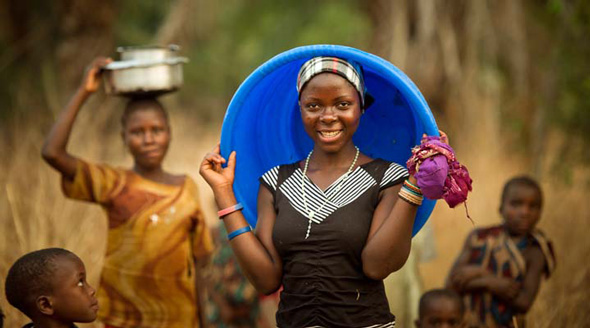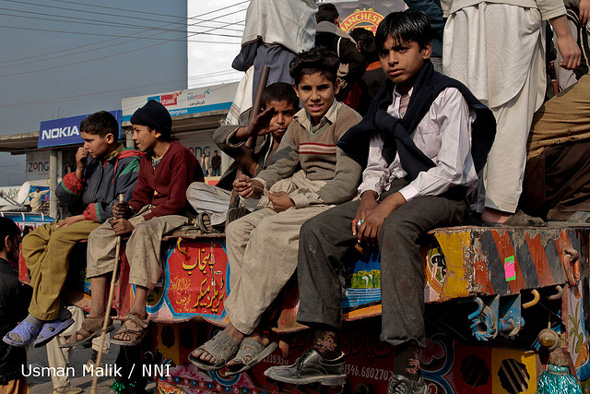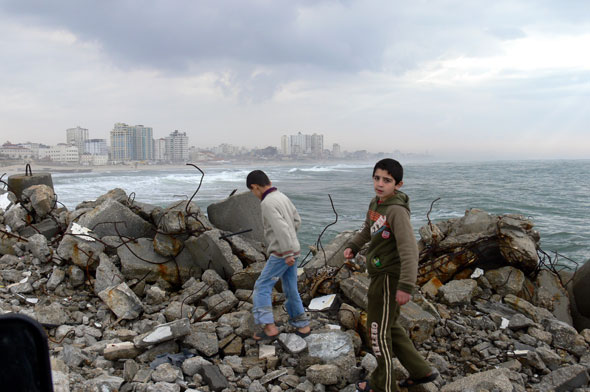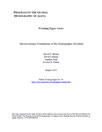-
Making ‘Beyond Seven Billion’: Reporting on Population, Environment, and Security
›“When I embarked on this series, I approached it as an environmental reporter: What does a growing number of us and growing consumption mean for our planet?” said Los Angeles Times reporter Ken Weiss at the Wilson Center on October 9. Weiss, along with photographer Rick Loomis, recently completed a five-part series and multimedia presentation on global population that was the culmination of a year of research and travel through more than six countries. [Video Below]
-
Education as a Conservation Strategy – Really?
›
The original version of this article appeared in The Nature Conservancy’s October issue of their Science Chronicles newsletter.
It seems like everywhere you turn recently, you hear how the planet’s population is headed to 10 billion. And obvious questions follow: How can we balance far more people with the natural resources needed for their survival? How will we get more food? How will we get more energy?
-
Youth Bulge, Public Policy, and Peace in Pakistan
›October 26, 2012 // By Payal Chandiramani
While Pakistan’s demographic challenges are perhaps well known – two-thirds of the population of 180 million is under 30 years old – increasing security concerns have prompted discussions about exactly how much the country’s youthfulness is affecting its prospects for peace. On October 10, the U.S. Institute of Peace and George Mason University’s School of Public Policy hosted a day-long conference on “Youth Bulge, Public Policy, and Peace in Pakistan” to tackle this question.
-
Kathleen Mogelgaard on How Malawi Shows the Importance of Considering Population, Food, and Climate Together
›October 24, 2012 // By Carolyn LamereQuantifying the role population plays in food security is “an incredibly powerful piece of information,” said Kathleen Mogelgaard in an interview with ECSP. Malawi is a case in point.
Mogelgaard saw the connections between food, population, and climate change firsthand on a recent trip to the southeast African country, whose population of 15 million is largely dependent on subsistence, rain-fed agriculture. “One in five children in Malawi is currently undernourished,” Mogelgaard said, and climate change paints a bleak picture for the future.
-
Population and Environment in Saadani National Park, and Repositioning Family Planning in Sub-Saharan Africa
›Tanzania’s Saadani National Park is a hotbed of biodiversity and, like other national parks in the region, it’s surrounded by human activity. A report by the BALANCED Project, “Population, Health, Environment Situational Analysis for the Saadani National Park Area, Tanzania,” provides a snapshot of the population, health, and environment situation inside the park to serve as a baseline for future activities of the Tanzania Coastal Management Partnership (TCMP) – a joint initiative of the government of Tanzania, USAID, and the University of Rhode Island’s Coastal Resources Center. A behavioral monitoring system implemented in June 2009 used surveys that reached a total of 437 respondents (54 percent women) from eight villages to analyze the “behaviors that positively and negatively influence the utilization and condition of natural resources.” The surveys found that arable land is scarce, fisheries are being depleted, and people have inadequate access to healthcare, water, sanitation, fuel, and family planning resources. The results suggest a strong case for expanding TCMP’s existing integrated approach – combining HIV/AIDS, conservation, and livelihoods goals – to include promotion of positive behavior changes, particularly as they relate to family planning and the effects of population growth on biodiversity loss and resource depletion.
-
Immediate Action Needed for Gaza to be Livable in 2020, Says UN Report
›October 3, 2012 // By Kate Diamond
Eight years from now, the Gaza Strip will have “virtually no reliable access to sources of safe drinking water, standards of healthcare and education will have continued to decline, and the vision of affordable and reliable electricity for all will have become a distant memory for most,” according to a United Nations report released last month. The bleak assessment concludes that without immediate action to address immense and interconnected economic, demographic, environmental, infrastructure, and social challenges facing Gazans, “the already high number of poor, marginalized and food-insecure people depending on assistance will not have changed, and in all likelihood will have increased.”
-
Simon Zadek, Project Syndicate
Age Against the Machine
›September 21, 2012 // By Wilson Center StaffThe original version of this article, by Simon Zadek, appeared on Project Syndicate.
The elderly are a crucial link in the chain that binds generations and sustains civilized society. Today, however, older people are largely considered to be out of touch with the modern, technology-driven world, and incapable of paying their own way. But much evidence shows otherwise: If aging were framed as an economic opportunity, the growing number of older people worldwide could become modernity’s gift, rather than society’s burden.
-
Modeling Demographic Dividends, Fertility, and Income in Developing Countries
› The poorest households gain the least when countries reap the demographic dividend, according to a preliminary draft of a new study by four Harvard School of Public Health researchers. In “Microeconomic Foundations of the Demographic Dividend,” authors David Bloom, David Canning, Günther Fink, and Jocelyn Finlay write that 18 years of Demographic Health Surveys (DHSs) from 60 developing countries show that while declining fertility rates and dependency ratios can lead to rising incomes on a nationwide level, sub-nationally those trends occur unevenly and mostly benefit wealthier households. Poorer households, meanwhile, are likelier to see slower fertility declines, delaying the economic gains that can result from demographic transitions, and increasing inequality. Importantly, the authors emphasize that the study reflects “the early stages of the demographic transition”; long-term economic effects of fertility decline, they write, “remain ambiguous.”
The poorest households gain the least when countries reap the demographic dividend, according to a preliminary draft of a new study by four Harvard School of Public Health researchers. In “Microeconomic Foundations of the Demographic Dividend,” authors David Bloom, David Canning, Günther Fink, and Jocelyn Finlay write that 18 years of Demographic Health Surveys (DHSs) from 60 developing countries show that while declining fertility rates and dependency ratios can lead to rising incomes on a nationwide level, sub-nationally those trends occur unevenly and mostly benefit wealthier households. Poorer households, meanwhile, are likelier to see slower fertility declines, delaying the economic gains that can result from demographic transitions, and increasing inequality. Importantly, the authors emphasize that the study reflects “the early stages of the demographic transition”; long-term economic effects of fertility decline, they write, “remain ambiguous.”
Showing posts from category demography.











